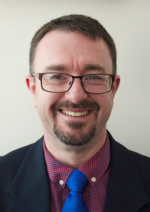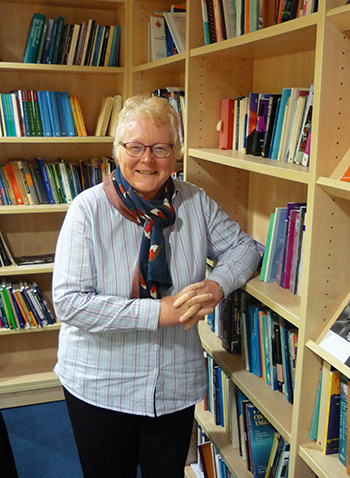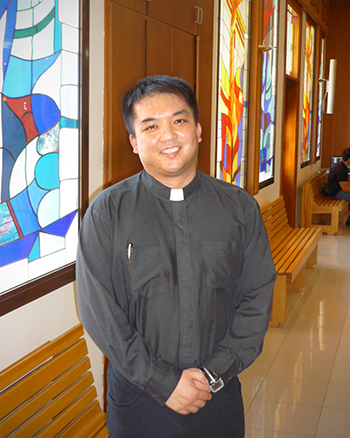ABM Archive Website
THIS WEBSITE CONTAINS ARCHIVE MATERIALS FOR HISTORICAL REFERENCE ONLY
For up-to-date information, including our latest appeals, news, and resources, please visit our current website.
A journey to England and the Middle East
January 19, 2017

In November 2016 ABM’s Partnerships Coordinator, Robert McLean, travelled to England and to the United Arab Emirates for ABM. It proved to be an invaluable time of learning, meeting new and old acquaintances, and seeing the compassionate heart of the Anglican Church across two continents.
In this thoughful article, Robert McLean reflects on his experiences, and shares some useful resource he discovered along the way.
“In England I attended the Archbishop of Canterbury’s Partnership for World Mission Conference in Swanwick, Derbyshire. The conference’s theme was Going the extra mile: Mission in a moving world. The speakers came from a variety of backgrounds, and each shone light on the church’s response to refugees, from a theological or a practical viewpoint. Dr Harvey Kwiyani, director of Missio Africanus (a cross-cultural missions training initiative that equips African and other non-Western churches in Europe and North America for missional effectiveness in Western cultures) spoke of Jesus being a migrant – not only because of his refugee experience in Egypt, but because he had left the glory of heaven to come to be with us on earth. Dr Kwiyani also made the point that migration has been an intrinsic part of human experience for thousands of years. Alia Aboud, the Director for Development and Partner Relations at the Lebanese Society for Educational and Social Development spoke movingly about how the influx of Iraqi and Syrian refugees into Lebanon had transformed the churches there, causing them to become much more welcoming and far less suspicious of people from the Islamic faith. Kirsteen Kim, Professor of Theology and World Christianity at Trinity Leeds University, spoke of the refugee experience in the West and noted how ‘where do you come from?’ can be seen as a question that separates people into separate ‘them and us’ boxes, whereas ‘how are you? is a much more open kind of a welcome. Fr Malcolm Bradshaw, the Senior Anglican Chaplain in Athens spoke of the ways in which the churches in Athens were working together to help refugees. His assessment that the refugee ‘crisis’ was nothing of the sort was something we hadn’t seen in the media: about 1.5 million refugees have entered the EU – which means a population rise of just 0.18%. Compare that with, for example, Lebanon, which has had a population rise of around 33% because of refugees.
 |
|
Janice Price, the Church of England’s World Mission Policy |
“Along with listening to these interesting speakers there was the opportunity to meet people from around the Church of England and the Anglican Communion more broadly. Among these were the Rev Lee Batson (Diocese of Chelmsford, a Trustee of the Friends of Marsabit – an Anglican diocese that serves people living in the north of Kenya), Janice Price (the Church of England’s World Mission Policy Adviser), the Rev Richard Bartlett, Rebecca Boardman and the Rev Evie Vernon (from United Society Partners in the Gospel), the Rev David Copley and the Rev Elizabeth Boe (from the Episcopal Church) and Karen Hotte (CEO of the Global Episcopal Mission Network). It was good to be able to learn from them and to be able to share ABM’s perspectives as well as copies of Suggested Guidelines for Successful Church Partnerships, a resource developed by ABM and available on our website at https://archive.abmission.org/resources.php?action=list-items&catId=22. After the conference I was able to spend some time with Janice Price, who has been researching companion links around the Anglican Communion. Her research is showing that what people value the most about them isn’t that monetary help has been given or received but that deep friendships have formed between one part of the Anglican world and another.
“When I returned to London I met with the Anglican Communion Office’s Director for Mission, the Rev John Kafwanka, a Zambian national who trained for the priesthood in Melbourne and with the Rev Rachel Carnegie, the Co-Director for the Anglican Alliance. It was fascinating to meet with them and to learn more about their work (see http://www.anglicancommunion.org/mission/anglican-witness.aspx and https://anglicanalliance.org). While I was there John gave me some copies of Deeper Engagement: A tool-box of resources from the Bible in the Life of the Church. This is an excellent set of resources for anyone interested in Bible study. It can be accessed online at www.bilc.org
“On the way back to Australia I was lucky enough to be able to spend some time in the United Arab Emirates (in Dubai and in Sharjah). I was staying with Fr Drew Schmotzer, whom I first met in NZ at a missions conference in Waikanae. Since then he’d visited Australia for ABM’s Good Friday Gift (he was then Archbishop Mouneer’s Chaplain in Cairo), and I’d caught up with him in Egypt. Fr Drew is now the Chaplain at St Martin’s Church in Sharjah. Along with the main church, there are offices, a Bible Society shop, and something like nine chapels all contained within the one building. There’s also a baptismal pool in the compound. Because the Anglican compound is home more or less to all the non-Orthodox and non-Catholic congregations, there are 127 groups that use St Martin’s per week, mainly on Fridays and Sundays, the two holy days in that part of the world. On those days the building is used from 6am till 11pm. It was certainly busy the day I visited.
 |
|
The Rev Harry Ching at Christ Church, Jebel Ali, UAE. |
“It was a Friday and there were hundreds of people around the complex. Before the Anglican service began there was a full-immersion baptism of a man from Tamil Nadu in India who works in Dubai. He is a member of the Church of South India, a member of the Anglican Communion. It was wonderful to be there for to see him becoming, for a moment at least, the ‘world’s newest Christian’. A little while after the baptism we began the Eucharist in the church itself. There were about 175 people there, most from the Indian subcontinent, but many from Western Africa. Apart from Fr Drew, the diocesan bishop, the Rt Rev Michael Lewis and me, there was only one other Westerner in the congregation. It was the first time that there choir wore robes, so the bishop blessed them as the service began. At the end of it, there were songs performed by the children and teenagers of the church, then there were some delicious samosas served for morning tea. Eventually we retired to Fr Drew’s house, where there was a luncheon for parish councillors and their families to meet with Bishop Michael. It was good to be able to meet with them all and learn a little about what it is like to be an Anglican in the UAE.
“While I was in the UAE I was also able to visit Christ Church, Jebel Ali, where I met with the Rev Harry Ching, a deacon who had just moved to Dubai from Famagusta in Turkish-administered Cyprus. ABM has been funding Harry’s work as a chaplain for Christian university students at a university in Famagusta. Because of arrangements with the Turkish Government students from various countries are able to study at Turkish universities. Many of Harry’s former congregation came from places like Nigeria and Zimbabwe to study. Harry tells me that the chaplaincy has been taken over by a lay reader, and so it continues on.
“Soon after arriving at Christ Church, Harry and I accompanied the Senior Chaplain, the Rev Tim Heaney, next door to the Sikh gurdwara. There was an event being held as part of the UAE’s first ever Tolerance Week. Blankets were being handed to the poor to keep them warm during winter. After some speeches and photographs, we were invited for lunch and were treated to some very delicious vegetarian Indian cuisine.
“After lunch Harry and I visited some of the other Jebel Ali churches in the ‘non-Muslim compound’ – the Churches of Christ, the Syrian Orthodox Church and the Coptic Orthodox Church. Each were large and interesting buildings. (Like Dubai, the churches in Sharjah are all together in a row, and so next to St Martin’s in Sharjah there are other churches such as an ornate Russian Orthodox one in eggshell blue, and an Armenian one.) After finishing with Harry I caught the train back to Sharjah (excellent service) and managed more or less to get back to Fr Drew’s house, in a taxi without having his actual address or phone number – we only ever talk on Facebook normally! Mercifully, Fr Drew had given such a good commentary as he was driving me to Jebel Ali in the morning that I knew where I was heading, even in the dark.
“One of the joys of being in Dubai was meeting the Bishop of Cyprus and the Gulf, Michael Lewis. We talked about the parishes in the diocese and how most of them are filled with Indian migrant workers rather than with expat Brits. It was very interesting to learn from Bishop Michael about the Diocese of Iran, one of the others in that province. The diocese is in the process of getting a new bishop as Bishop Humphrey Peters has just retired. It is hoped that the new bishop will live in the country: Bishop Peters was unable to do so for one reason or another. I had thought that maybe the church in Iran was made up of migrants who live in Iran but the small diocese is made up of Iranian citizens. Please pray for them as they await their new bishop.
You can read more about the Diocese of Cyprus and the Gulf at http://cypgulf.org.


